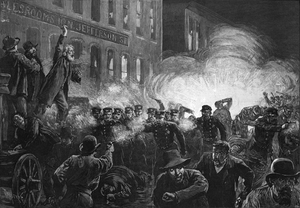More languages
More actions

The Haymarket affair was the series of events in Chicago, Illinois, United States surrounding a strike beginning on May, 1 1886 and a subsequent massacre by police, a rally on May 4 where an unknown person threw a bomb at police, who responded by again massacring workers; and the arrest, trial, and execution of anarchist and socialist political organizers in the aftermath and the political repression associated with it.[1]
Strike and Massacre[edit | edit source]
A strike supporting the 8 hour work day began on May 1, 1886 with more than 35000 workers walking out of their jobs in Chicago, joined by tens of thousands more in later days and even more throughout the country. On May 3, after days of fighting between workers and police, at least 2 strikers were murdered by police. Anarchist organizers called for a protest at Haymarket square, with some printing leaflets titled "Revenge! Workingmen to Arms!!!" Some of the anarchist organizers were not supportive of the militant language used and urged a more peaceful gathering, and this was eventually decided on.[2]
May 4th Rally[edit | edit source]
The rally at the Haymarket Square was smaller than initially expected and several planned speakers did not arrive.
Police arrived at the rally, heightening tensions. Near the end of the rally a bomb was thrown at them. It is unknown who threw the bomb, but after it exploded chaos followed, with police shooting protesters and other police. Four workers and seven police were killed.[3]
Trial[edit | edit source]
Albert Parsons, August Spies, Adolph Fischer, George Engel, Louis Lingg, Samuel Fielden, Michael Schwab, and Oscar Neebe-all Anarchists or Socialists-were arrested in the aftermath and charged with the murders of police officers. The location of all 8 at the time of the bombing was confirmed and those who were at the rally were all in view of all the protesters and police who confirmed they could not have thrown the bombs. Still, all were found guilty. Oscar Neebe was sentenced to 15 years in prison, and the seven others were sentenced to death. Shortly before the scheduled execution 2 of those-Samuel Fielden and Michael Schwab-had their sentences commuted to life in prison.[3]
Executions[edit | edit source]
the execution was set for November 11 1887. On November 10 Louis Lingg died, allegedly by suicide, by a small bomb detonated in his mouth. The next day the other 4 were hanged. Before he died August Spies shouted, "The day will come when our silence will be more powerful than the voices you are throttling today." These words are written on the Haymarket Martyrs monument outside of Chicago.
Legacy[edit | edit source]
The Haymarket Martyrs became a symbol for Socialists, Anarchists, Trade Unionists and Communists. May Day, held of May 1, was chosen to commemorate the protest that would eventually lead to the execution of the Haymarket Martyrs. John Peter Atgeld pardoned those who were still alive and condemned the trial. Reactionary former mayor of Chicago Lori Lightfoot negatively compared the Haymarket Martyrs and the protests they were involved in to the Black Lives Matter protests in 2020 saying, “people feared for their safety from groups of anarchists who routinely created chaos in the streets.” Various protest organizers have celebrated the Haymarket Martyrs throughout the United States and the world.[4]
References[edit | edit source]
- ↑ Albert Szymanski (1984). Human Rights in the Soviet Union: 'The Land of the Free' (p. 162). [PDF] London: Zed Books Ltd. ISBN 0862320186 [LG]
- ↑ "Haymarket and May Day". Encyclopedia of Chicago.
- ↑ 3.0 3.1 Haymarket Affair. Illinois Labor Historu Society.
- ↑ Jeff Schruhke (2023-1-5). "Chicago Never Forgot the Haymarket Martyrs" Jacobin.
